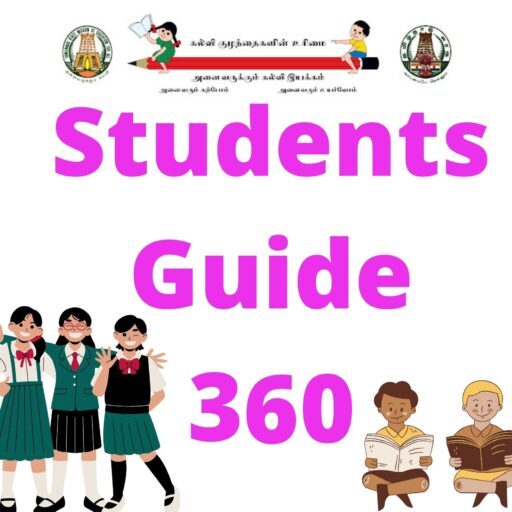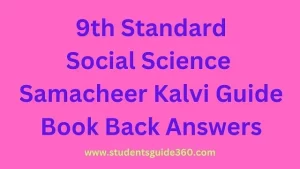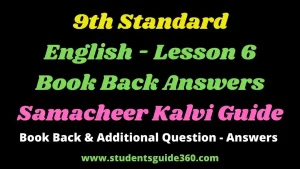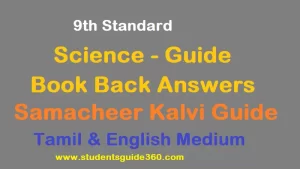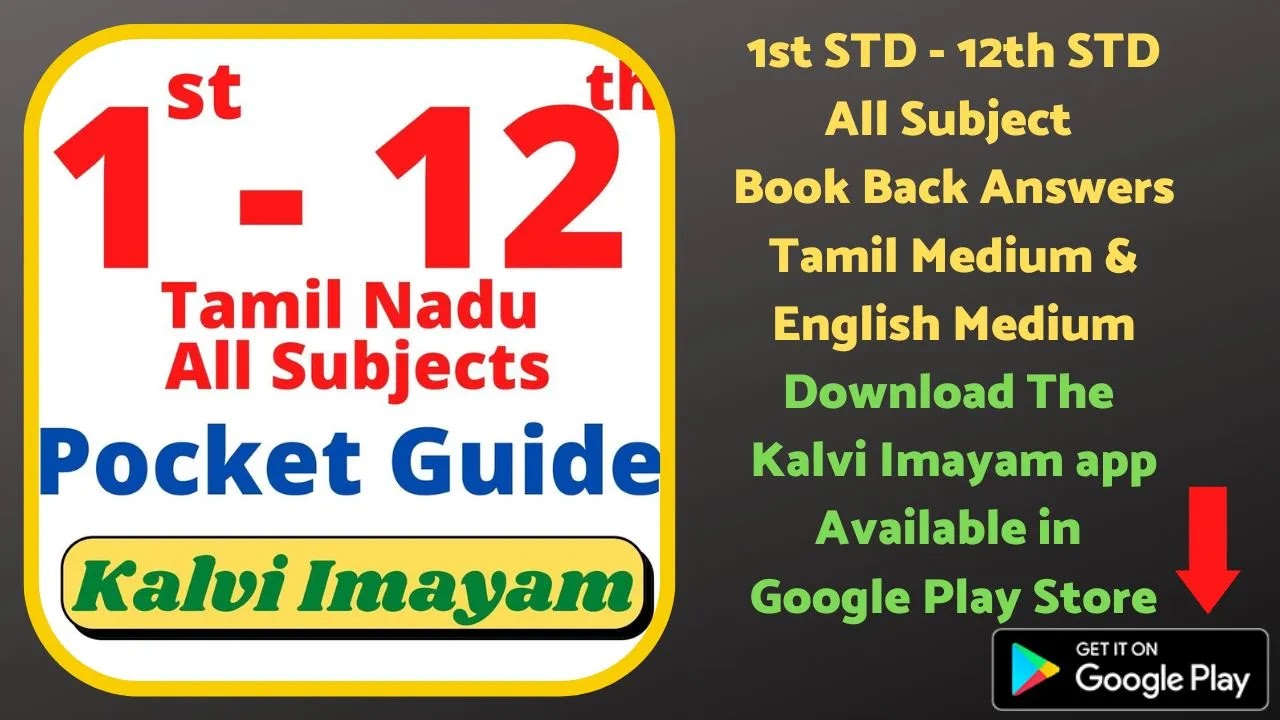9th Social Science (History) Lesson 8 Book Back Answers
9th Standard Social Science Unit 8 The Beginning of the Modern Age Book Back Answers History Lesson 8 The Beginning of the Modern Age Book Back Answers English Medium. 9th All Subject Book Answers. Class 9 Social Science All Unit Book in Answers TM & EM.
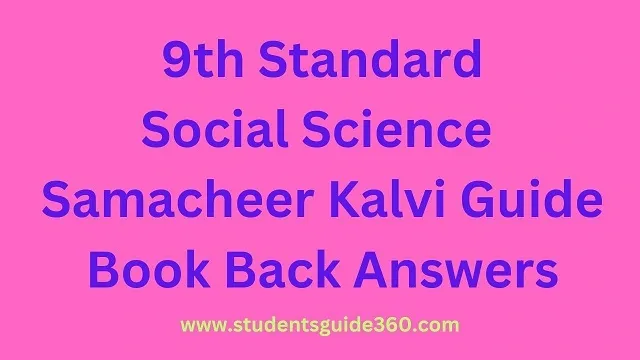
9th Social Science (History) Lesson 8 The Beginning of the Modern Age Book Back Answers
I. Choose the correct answer:-
1. Who among the following is known as the Father of Humanism?
- Leonardo da Vinci
- Francisco Petrarch
- Erasmus
- Thomas More
Ans :Francisco Petrarch
2. The School of Athens was painted by
- Raphael Sanzio
- Michelangelo
- Albrecht Durer
- Leonardo da Vinci
Ans :Raphael Sanzio
3. William Harvey discovered ……………
- Heliocentric theory
- Geocentric theory
- Gravitational force
- Circulation of blood
Ans : Circulation of blood
4. Who wrote the 95 Theses?
- Martin Luther
- Zwingli
- John Calvin
- Thomas More
Ans : Martin Luther
5. Who wrote the book Institutes of Christian Religion?
- Martin Luther
- Zwingli
- John Calvin
- Cervantes
Ans: John Calvin
6. Which sailor was the first to cross the Equator?
- Henry, the Navigator
- Lopo Gonzalves
- Bartholomew Diaz
- Christopher Columbus
Ans : Lopo Gonzalves
7. …………… named the sea as Pacific Ocean as it was very calm.
- Columbus
- Amerigo Vespucci
- Ferdinand Magellan
- Vasco-da-gama
Ans :Ferdinand Magellan
8. The continent of America was named after ……………
- Amerigo Vespucci
- Christopher Columbus
- Vasco da Gama
- Hernando Cortez
Ans :Amerigo Vespucci
9. …………… was the headquarters of the Portuguese possession in the East.
- Manila
- Bombay
- Pondicherry
- Goa
Ans : Goa
10. Which among the following plants were introduced from America to Europe?
- Sugarcane
- Sweet Potato
- Rice
- Wheat
Ans : Sweet Potato
II Find out the correct statement:-
1. a) Martin Luther broke away from the Catholic Church because he was discriminated.
b) John Calvin’s government in Geneva was liberal and fun-filled.
c) King Henry VIII had deep theological differences with the Catholic Church.
d) Council of Trent reemphasized the importance of ceremonies and significance of the mass.
Ans : d) is the correct statement
2. a) Discovery of new lands and sea routes shifted the economic centre from Italian city states to Spain and Portugal.
b) Horses were native to America.
c) During the begining of the Modern Age, State did not interfere in economic activities.
d) The Portuguese collaborated with the Arabs in its trading activities in India
Ans : a) is the correct statement
IV. Match the following:-
1. Feudalism -A. Monopoly Trade
2. Humanism -B. Trial of Heretics
3. Inquisition -C. Movement of goods between America and Europe
4. Mercantilism -D. Hierarchical socio-economic structure
5. Columbian Exchange -E. Human dignity
Ans: 1 – D, 2 – E, 3 – B, 4 – A, 5 – C
V. Answer all questions given under each heading:-
1. Renaissance :
a) Give reasons as why renaissance originated in the Italian city-states.
There was a rebirth or revival of classical Greek and Latin literature
b) Name some of the important humanists and their works.
Dante wrote Divine Comedy, Machiavelli wrote The Prince and Erasmus wrote ‘In praise of Folly’.
c) List the differences between medieval art and Renaissance art.
- The idea of humanism was the central feature of Renaissance art. It was missing in Medieval art.
- Renaissance paintings and sculptures were realistic and naturalistic.
- They portrayed natural landscapes, human anatomy, emotions and ideas.
d) Describe humanism.
A new concept developed during the Renaissance period. According to that, the humans are endowed with attributes that are to be used to achieve greatness. The focus shifted from life after death to life in this world. This is known as Humanism.
2. Reformation :
a) Why did Martin Luther protest against the Church?
The sale of indulgences, sale of offices and other corrupt practices made Martin Luther to protest against the Church.
b) What is the doctrine of justification by faith?
He said that by faith alone that one could attain salvation. The grace of god would be bestowed by the divine will alone and not by the deeds of the people.
c) Why did Henry VIII establish the Anglican Church?
King Henry VIII of England longed for a son to succeed him to the throne. So he appealed to Pope to annul his marriage with Catherine. The Pope kept evading his decision. So the king established the Anglican church.
d) Mention the contribution of Ignatius Loyola.
St. Ignatius Loyola founded the Society of Jesus to propagate Christianity. It main work was to spread education and service to the destitute. The members of the society were present all over the world to spread the Catholic religion.
3. Geographical Discoveries :
a) Who is Henry, the Navigator?
Prince of Portugal.
b) List the causes for the geographical discoveries.
- Encouragement shown by Henry, the Navigator of Portugal for long sea voyages.
- Ottoman Turks they captured Constantinople in 1453 and blocked the land route between the East and West.
- Support of the monarchs.
c) What led to the extinction of the natives of America?
Slave trade.
d) What is triangular trade?
The Trans-Atlantic Trade was a triangular trade
VI Answer the following briefly:-
1. Explain how the invention of printing press influenced Renaissance, Reformation and Geographical discoveries.
- Johannes Gutenberg invented the printing press in Germany in the middle of the 15th century.
- After the invention, the printing press enabled the production of multiple copies of manuscripts.
- In less than fifty years, about six million books were printed.
- The press not only spread the knowledge but also influenced Renaissance, Reformation and Geographical discoveries.
2. Write a short note on the impact of Renaissance.
- The most important contribution of the Renaissance was the concept of humanism.
- It marked a definite shift towards individualism, secularism and nationalism.• The introduction and practice of writing in the vernacular enriched the growth of vernacular languages.
- Renaissance made a beginning in criticizing the corrupt practices of the Church.
- The curiosity kindled by the Renaissance played a major role in the discovery of new land routes.
3. Outline the differences of Martin Luther with the Catholic Church.
- He opposed the luxurious life lived by the officials of the Church.
- He was against the sale of indulgences and Church offices at an auction.
- He rejected the belief that ceremonies and penances would lead to salvation.
- The Bible could be read and interpreted by all and not by the Church alone.
- He rejected the role of the Church as an intermediary between the individual and God.
4. Write a brief note on Counter Reformation.
- The Protestant reformation posed threat to the Catholic Church.
- Pope Paul III and his successors took a number of measures to reform the Church.
- They dealt with corruption and stopped the sale of offices.
- The Council of Trent reemphasized the importance of ceremonies and the significance of the mass.
- Further, it revitalized the Inquisition to deal with opposition to the Church.
- It also gave official sanction to the Society of Jesus.
- This reformation of the Catholic Church from within is known as Counter Reformation.
5. What is Columbian Exchange?
The most important outcome of the conquest of America by the European colonial powers was the movement of plants, animals, technology, culture and strange diseases between the Americas and Europe or between the New World and the Old World. This is known as Columbian Exchange.
VII Answer the following in detail:-
1. Discuss how Renaissance, Reformation and Geographical discoveries heralded the modern age?
The modern era was characterized by freedom of thought, individualism, rationalism and economic and scientific progress. This age was heralded by Renaissance, Reformation and Geographical discoveries.
Renaissance:
- It marked a definite shift towards individualism, secularism and nationalism.
- It made a beginning in criticizing the corrupt and worldly practices of the Church.
- It contributed the intellectual basis for the rise of nation states.
Reformation:
- In the middle ages, the Church enjoyed both spiritual and temporal powers. In due course of time, corruption entered the Church.
- The critical thinking and inquisitive spirit of Renaissance humanism helped people to question such practices of the Church.
- The Reformation movement started by Martin Luther marked the first successful break from the Church. After this, a lot of measures were taken to reform the Catholic Church.
Geographical discoveries:
- The geographical discoveries transformed the European understanding of the world.
- Geographical discoveries led to Commercial Revolution and the emergence of banking and joint-stock companies.
- As a result of geographical discoveries, the 17th century witnessed the emergence of various East India Companies.
- It led to colonialism and exploitation of the resources of the colonies.
2. Examine the outcome of the geographical discoveries.
- The Ottoman Turks captured Constantinople in 1453 A.D was the main cause for the geographic discoveries in the 15th century.
- Outcome of the geographical discoveries –
- The geographical discoveries transformed the European understanding of the world.
- It led to the redrawing of the world map.
- The discovery of new lands and sea routes shifted the economic centre of Europe from Italian city states to Spain and Portugal.
- Europe also exported deadly diseases such as small pox, measles, chicken pox, malaria, typhus, etc., to Asian and African continents.
- The mass extinction of the native population led to the import of slaves from Africa.
- Congo, Gambia and Senegal became important centres of slave trade in Africa.
- Geographical discoveries led to Commercial Revolution and the emergence of banking and joint-stock companies.
- As a result of geographical discoveries, the 17th century witnessed the emergence of various East India Companies.
- It led to colonialism and exploitation of the resources of the colonies.
- It represented an important stage in the development of modern capitalism.
